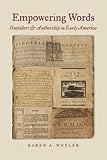Empowering words : outsiders and authorship in early America / Karen A. Weyler.
Material type: TextPublication details: Athens : The University of Georgia Press, (c)2013.Description: 1 online resource (xiii, 311 pages) : illustrationsContent type:
TextPublication details: Athens : The University of Georgia Press, (c)2013.Description: 1 online resource (xiii, 311 pages) : illustrationsContent type: - text
- computer
- online resource
- 9780820343259
- PS185 .E476 2013
- COPYRIGHT NOT covered - Click this link to request copyright permission: https://lib.ciu.edu/copyright-request-form
| Item type | Current library | Collection | Call number | URL | Status | Date due | Barcode | |
|---|---|---|---|---|---|---|---|---|
 Online Book (LOGIN USING YOUR MY CIU LOGIN AND PASSWORD)
Online Book (LOGIN USING YOUR MY CIU LOGIN AND PASSWORD)
|
G. Allen Fleece Library ONLINE | Non-fiction | PS185 (Browse shelf(Opens below)) | Link to resource | Available | ocn842875113 |
Browsing G. Allen Fleece Library shelves, Shelving location: ONLINE, Collection: Non-fiction Close shelf browser (Hides shelf browser)
Includes bibliographies and index.
Introduction : Outsider authorship in early America -- Mourning New England : Phillis Wheatley and The broadside elegy -- An "Englishman under English colours" : Briton Hammon, John Marrant, and the fungibility of Christian faith -- "Common, plain, every day talk" from "an uncommon quarter" : Samson Occom and the language of the execution sermon -- Becoming "the American heroine" : Deborah Sampson, collaboration, and performance -- "To proceed with spirit" : Clementina Rind and the Virginia Gazette -- When barbers wrote books : mechanic societies and authorship -- Conclusion : Uncovering other outsider authors.
Standing outside elite or even middling circles, outsiders who were marginalized by limitations on their freedom and their need to labor for a living had a unique grasp on the profoundly social nature of print and its power to influence public opinion. In this book, the author explores how outsiders used ephemeral formats such as broadsides, pamphlets, and newspapers to publish poetry, captivity narratives, formal addresses, and other genres with wide appeal in early America. To gain access to print, outsiders collaborated with amanuenses and editors, inserted their stories into popular genres and cheap media, tapped into existing social and religious networks, and sought sponsors and patrons. They wrote individually, collaboratively, and even corporately, but writing for them was almost always an act of connection. Disparate levels of literacy did not necessarily entail subordination on the part of the less literate collaborator. Even the minimally literate and the illiterate understood the potential for print to be life changing, and outsiders shrewdly employed strategies to assert themselves within collaborative dynamics. This book covers an array of outsiders including artisans; the minimally literate; the poor, indentured, or enslaved; and racial minorities. By focusing not only on New England, the traditional stronghold of early American literacy, but also on southern towns such as Williamsburg and Charleston, the author limns a more expansive map of early American authorship. --
COPYRIGHT NOT covered - Click this link to request copyright permission:
There are no comments on this title.







